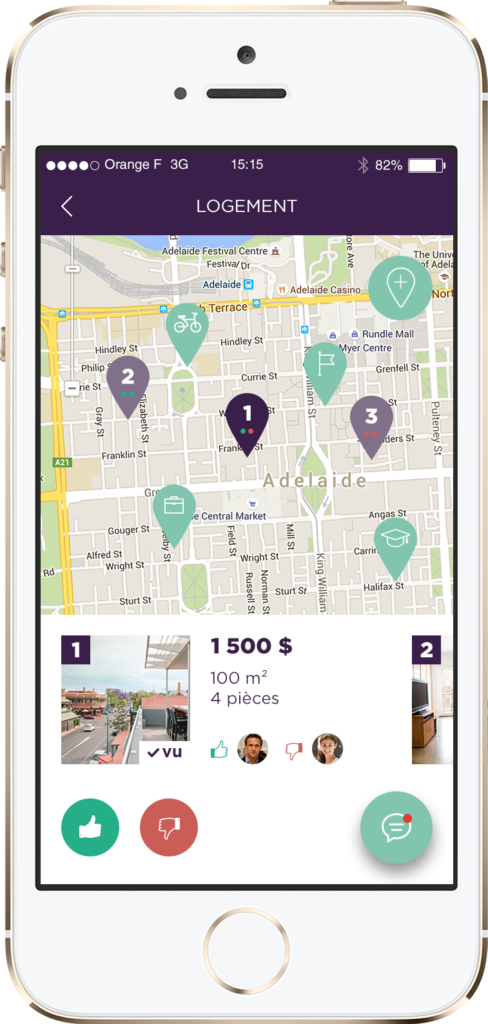How can virtual tours help expatriates find housing faster?
Seeking housing is often a daunting task for expatriates.
Housing not only needs to be found quickly, but it’s also generally necessary for it to be temporary and therefore furnished — no easy task given the highly competitive markets in most major cities.
But in recent years, long-distance property searching has really boomed. Following consecutive lockdown measures due to COVID, the increasing use of electronic administrative procedures, and the proliferation of remote working, virtual apartment tours are now gaining popularity and proving to be a highly effective way of meeting expatriates’ needs.
Although virtual tours have seen prominent use in the real estate industry, especially for buying property during COVID, how can they be put to use in the relocation industry? What are the pros and cons for expatriates? How can these new online property search tools be best utilised to streamline the expatriation experience for employees and their families?
Virtual tours, remote viewings… which works best for expatriates?
With remote house and apartment viewings seeing increased use in the real estate industry, the concept quickly began to spread under a number of different names: virtual tours, guided tours, remote guided tours, 3D tours, and so on.
But the situation for an assignee moving abroad with their family is very different from that of a private individual looking to buy or rent property.
Above all, the future expatriate wants flexibility and to save time, while obviously still benefitting from sound advice and support.
When choosing temporary or permanent housing, assignees need to be able to react quickly while still juggling the challenges of not being present and not having enough information about where they’ll be going.
So, what are the most effective ways of helping them find housing remotely?
A remote virtual tour without the expatriate
A remote guided tour takes place without the employee being present and is led by a relocation specialist who takes photos and videos that are then shown to the employee and/or their partner during a subsequent meeting.
The relocation specialist is hired by the soon-to-be expatriate’s company and keeps the employee’s interests in mind at all times.
WHEN I’M LEADING A VIRTUAL TOUR, I DON’T JUST TAKE PHOTOS OF THE PROPERTY, I ACTUALLY DO THE WHOLE TOUR. I LOOK AT EVERYTHING WITH THE GREATEST SCRUTINY, FROM THE OUTSIDE OF THE BUILDING, TO EVERY LAST DETAIL INSIDE THE PROPERTY. I ALSO TAKE VIDEOS OF THE OUTSIDE (AND INSIDE) SO THE EMPLOYEE CAN PROPERLY ASSESS THE SURROUNDINGS, ESPECIALLY NOISE LEVELS DURING THE DAY. THIS THEN LETS ME CHECK WHETHER THIS COULD BE AN ISSUE FOR THEM.
LAYLA MANVILLE, RELOCATION MANAGER – MRS MANAGEMENT
The specialist describes each room and speaks candidly about their thoughts on the property, adding further details about the quality of fixtures and fittings and providing points of comparison with other properties visited in the same area.
When expatriates have a tight schedule, letting a third party completely handle the virtual tour is an ideal solution, given the urgent need to find a furnished apartment and the limited time they have available due to time differences, etc. This is frequently the case for short-term assignments involving young talent.
A live remote tour with the expatriate
In this instance, the specialist carries out the tour remotely, with the employee watching using an app like FaceTime or WhatsApp.
This means that any questions or objections raised by the prospective tenant can be addressed immediately. While photographs can be used to check certain details, a video call can help alleviate any concerns the absent employee may have.
Nowadays, mapping apps make it simpler than ever to pinpoint the location of a property and check whether it meets the expectations of the employee and their family: is it close to a school, the city centre, and away from noise pollution from major roads? Assignees are now able to quickly and easily decide whether or not an area is right for them.
A 3D or 360° virtual tour
Virtual tours are by far the best known and most famous method of all! Often paired with 3D techniques or 360° tours, they completely immerse visitors in the property and are frequently used for new property developments. However, despite being very fashionable, they can lack the personal touch that expatriates typically need, given that the latter are often in the middle of a highly stressful period of transition and require reassurance and advice first and foremost.
The pros and cons of long-distance property searching
Virtual property searches present a number of advantages for both the employee and their HR manager or relocation coordinator:
- Responsiveness: the high demand for property, due to both scarcity and cost, means that decisions have to be made very quickly when an opportunity arises.
The property market in some countries is under even greater pressure than in others. Take France, for example, where increasingly stringent regulations are making landlords reluctant to rent or where prices are soaring as a result of the upcoming 2024 Olympic Games and an escalation of property being set aside as tourist accommodation. - Planning ahead: expatriates can start looking for somewhere to live long before they arrive in their new country, and by searching for property online well in advance, they can sometimes find a long-term rental without having to resort to short-term accommodation. Short-term rentals generally last for three months and are a major expense. They’re also difficult to keep on top of; it’s often necessary to prolong short-term rentals for a variety of reasons, usually due to difficulties in finding long-term accommodation.
Remote viewings save both time and energy for the expatriate while also saving the relocation department money on a short-term rental. - Flexibility: being physically available to visit a furnished apartment is no longer necessary.
Organising an in-person viewing requires the combined availability of the employee, the estate agent, and the relocation agency.
Remote viewing means a far greater number of opportunities. Sitting around until 6.30 p.m. or heading out at dawn for an appointment are things of the past, and in-person viewings can then be used exclusively for properties that have been shortlisted. Orientation trips are occasionally used to look for accommodation prior to the employee’s departure, but these are likely to be phased out, primarily for environmental reasons. - Responding to new practices: visiting an apartment online using your phone or choosing a rental from your computer are consumer habits that many expatriates have come to appreciate.
For HR and relocation managers, these practices represent a more modern way of working that values immediacy and matches the expectations of younger talent. Expatriate management is evolving!
Virtual property searching also has its drawbacks:
- Fewer properties on offer: some landlords are unwilling to conduct virtual tours. Sometimes they still have personal belongings on site or prefer not to have their privacy “intruded upon”.
- A more difficult task for families: virtual tours don’t let families get “a feel for the place” together or share the experience of the property. It’s much more difficult to reach a consensus on the choice of home, and what ultimately fuels this difficulty is integration. This is essential if expatriation is to be successful, as it involves feeling “at home”, which must be a feeling shared by all family members.
This factor must be taken into account, as families are often under a great deal of stress. Finding accommodation and a school, especially during the summer months, is a major undertaking. Families fear not being able to find anything for the start of the new school year and want to be able to send their children to school as soon as possible. In nearly all countries, school admission is conditional upon having a rental agreement. This means that virtual tours can provide a great deal of relief for families, enabling them to plan ahead for their accommodation and anticipate all the changes that follow! - Prospective tenants may be less likely to be considered: landlords might not give priority to applications from people who have not visited the property in person. They sometimes worry about a greater chance of prospective tenants pulling out once they have actually visited the property.
These are the reasons why providing adequate support for virtual tours is essential to a successful relocation.
How can virtual tours be improved for expatriates and their families?
Remote viewings are no substitute for active personal support
Many property managers nowadays are keen to keep the number of time-consuming and difficult-to-organise in-person visits to a minimum.
Instead, 360° tours on their websites are used as a means of screening visitors to find those who are genuinely interested.
Users can navigate the property and visit room by room, but it’s not always that easy to get a clear idea of what the property has to offer. Expatriates may overlook important details or not pay enough attention to the surrounding environment.
If the assignee is supported in their search by a reputable relocation specialist with sufficient market knowledge and a healthy relationship with estate agents, then they will have everything they need to make a calm, confident decision about their future accommodation.
As an impartial, trusted third party, the relocation specialist can highlight the strengths and weaknesses of the properties they visit or arrange remote viewings for the expatriates they’re assisting.
WE GUARANTEE ABSOLUTE TRANSPARENCY WITH OUR CLIENTS. IF, FOR INSTANCE, A PARQUET FLOOR CREAKS OR THE NEIGHBOURS ARE NOISY, WE MAKE IT OUR DUTY TO REPORT IT. OUR ROLE IS ALSO TO GIVE AN INFORMED OPINION ON THE LOCATION, THE NEIGHBOURHOOD, SURROUNDINGS, AND PRICE, AS WE KNOW THE MARKET INSIDE AND OUT.
The relocation specialist will also make use of their extensive network to find suitable off-market properties.
Using technology to simplify long-distance property searches

Quick Move
Developed by MRS, the Quick Move mobile app lets assignees begin looking for somewhere to live long before they arrive in their destination country.
Local estate agents post their properties, with photos and videos, right on the app. Videos also feature commentaries.
Employees’ partners also have access to the app and can actively participate in the property search, which is an excellent way of getting them involved in the project!
Sometimes, employees and their partners are too far apart for them to coordinate a quick response to properties posted on the app.
Let’s take an example. On Quick Move, the employee might find a furnished apartment that they like and add it to their favourites. Then, their partner, depending on how they feel about the property, can use the thumbs down emoji to express disapproval or the thumbs up emoji to give the go-ahead and get the ball rolling!
Explore all the other features of the Quick Move app!




